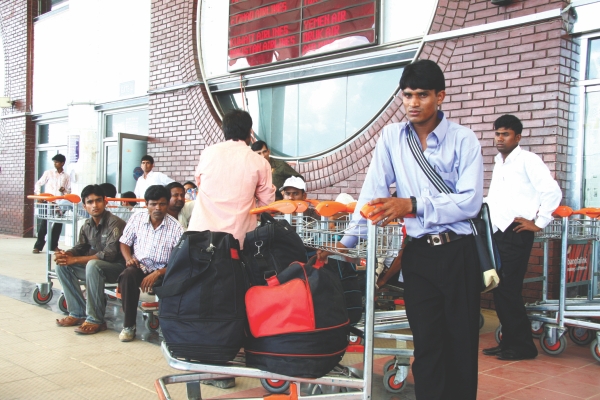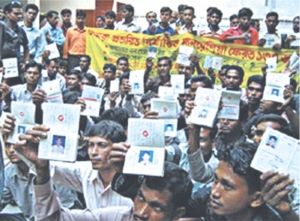| Home - Back Issues - The Team - Contact Us |
 |
| Volume 11 |Issue 22| June 01, 2012 | |
|
|
Special Feature
Can Government be the Saviour? The anticipated bilateral agreement for recruitment of Bangladeshi workers by Malaysia by eliminating middlemen hopes to reduce the suffering of migrant workers who are often victims of fraud Tamanna Khan The Lure of the Pied-Piper
Muhammad Zahed, another Malaysian migrant worker tells a similar tale of receiving a warning from Keya Travels, the recruiting agency that sent him to Malaysia in 2008. But, the actual amount was no secret even to government officials. Both Hasan and Zahed states how the BMET officials at the briefing, told them that they knew that they had paid more than Tk 80,000 but if asked no one was to admit so. Ironically, the premium paid by these poor workers was only the tip of the iceberg in the web of deception and fraud. Both Hasan and Zahed were given a rosy picture of the job in Malaysia, which shattered only moments before they boarded the plane.
Though things started to appear dubious even before they left their homeland, none of these unfortunate men volunteered to stay back. Not just Hasan and Zahed, every year, ever since Malaysia reopened its market in 2007, hundreds of Bangladeshis, despite the risks of possible fraud, have fallen into the trap of middlemen --- unscrupulous sub-agents and recruiting agencies in Bangladesh and outsourcing companies in Malaysia. They have paid huge amounts of money to go to Malaysia, selling off family assets and borrowing money at high rates. Most of them hoped they would earn enough to make up for the costly investment. The Supply – Demand Game The employers on the other hand, need to get approval from the Malaysian Home Ministry. “They have to pay levy (a government tax imposed on foreign workers) for each worker approved by the ministry and a work permit fee. After that either the employer comes to Bangladesh for recruitment of workers or on their behalf, on the basis of power of attorney, recruiting agents recruit the workers and submit the list to the employers,” says Mustafa. The list is then submitted to the Malaysian Home Ministry for issuance of visa. Once the visa is issued, agents get recruitment permission and emigration clearance from BMET and send the workers abroad. “This was the procedure they applied during that time and it proved to be very successful up to a certain point,” asserts Mustafa. Towards 1996, as the business of sending manpower to Malaysia became lucrative, the practice of fraud began to develop. More workers were sent than required and migration cost sky-rocketed. The excessive demand for Malaysian visas was one cause for the rise in migration cost but Mustafa also blames the naiveté of uneducated migrant workers, most of whom who come from villages and have never even seen a district town let alone a different country. “In villages some middle-men started to emerge,” he says, “There are at least one or two sub-agents, one in the village another in the city. They do not have any license so they almost have a free hand. They charge whatever they like to the poor workers who are unaware of the real situation.” Muhammad Zahed was a victim of this syndicate of sub-agents. He came across Santu, a Malaysia migrant worker who claimed to have 'visas' for sale. “I bought a “visa” from him for Tk 2.2 lakh,” Zahed says, “He told us that it would be possible to send me within two months. He asked for my passport and Tk 50,000 immediately. After 15 days, I was to go to Dhaka for a medical check-up and submit another half (of the amount) and finally the rest, when I boarded the plane.” Zahed tried to become a sub-agent himself a year after his entry into Malaysia. He bought five visas from Lipon, a Bangladeshi agent from Barisal who conducts his activities in Malaysia. “I had given him about Tk 3.3 lakh but lost the entire amount since the men could not enter Malaysia,” he laments. Later, Zahed, under pressure from his community leaders, had to return the money to the five men to whom he had promised the Malaysian jobs. Outsourcing – A Flawed System “Even if they did not get involved in any work they would be paid the minimum 1400 ringgit. Another good side was the money was to be given through a bank. But in reality, when the system was implemented, these companies (outsourcing agents) took people there, but did not provide them with any work for 3-4 months,” she adds. Shahed Hasan, who went to Malaysia in 2007, fell into the trap of one such outsourcing agent. He had no formal employment throughout the eight-month stay in Malaysia. He, along with 500 other Bangladeshi workers from three recruiting agencies, were under the control of Rosemaan, a Chinese outsourcing agent, who says Hasan, treated the workers like a herd. “I stayed at 6-8 places throughout my stay there. They used to shift us from one place to another, saying that they would provide us with jobs,” Hasan recalls how they were often locked up in go-downs of different factories and made to do menial jobs without payment. Anisur Rahman Khan, National Coordinator of International Migrants Alliance Research Foundation (IMA) says that sometimes the Bangladeshi recruiting agencies bribe the outsourcing agents to exaggerate the number of workers required. “If they (outsourcing agents) say that they do not have enough jobs for 100 people, they (recruiting agent) suggest making 100 people to work for the salary of 50 people.” Khan's claims are confirmed by Zahed. He says, “There are also middlemen there. The local middlemen take the money only once; instead of say 1 lakh they will charge 2 lakh. But the agents over there take commission every month. If a man earns Tk 30,000 per month, then he gets Tk 20,000 and the agent keeps Tk 10,000 from every single worker.” The visa approvals given by the Ministry of Home Affairs, Malaysia are often not transparent, claims Mohammad Harun Al Rashid, regional coordinator, Coordination of Action Research on Aids and Mobility (CARAM) Asia. “There are registered companies which do not have any operation,” he says. He explains that Malaysian agents obtain visa approval to recruit workers from Bangladesh for these fake companies. “They take approximately 2000-3000 ringgit for each Bangladeshi worker's visa from the Bangladeshi recruiting agencies. The recruiting agencies in turn take the money from the workers,” he adds. According to the immigration law, workers can only work in the company mentioned in the work permit. However neither Zahed nor Hasan ever got to work in the company from which they received and signed the offer letter. Hasan recounts how they were put up for display every night by the wife of the Chinese agent. “Every night, some stranger would visit the warehouse and check the men as they check cows during Korbani Eid and would take them away somewhere. We never knew where they were taken,” he says. Hasan considers himself lucky as the wife of his agent took a liking to him and gave him a job at her place as a house help without pay. He finally escaped with thirty other Bangladeshis, who were living like prisoners under the power of the Chinese agent, Rosemaan. They went to the Bangladesh High Commission in Kuala Lumpur but failed to receive any help there. Having no passport and employment, these men had no choice but to live in the gutters and shadowy spaces under Kuala Lumpur's flyovers. As news began to pour in from all quarters about the exploitation and abuse of Bangladeshi workers in Malaysia and the complaints against the malpractices of middlemen, the Malaysian government stopped recruitment of Bangladeshi workers altogether in 2008. In 2011, Malaysian government began to implement the 6P or Illegal Immigrant Comprehensive Settlement Programme which involves registration, legalisation, amnesty, supervision, enforcement and deportation. A Probable Solution
The Malaysian government has registered four lakh Bangladeshi workers of which 2.77 lakh workers are illegal. Expatriates' Welfare and Overseas Employment Minister Khandker Mosharraf Hossain says that the Malaysian authorities have enquired and found that the 2.77 lakh illegal workers overstayed in the country to recover the excessive migration cost. To put an end to this, Hossain on a five-day visit to Malaysia, proposed a government to government agreement to the Malaysian counterpart. Under the agreement the Bangladesh government will register all the overseas jobseekers and act as a facilitator in matching the employers' needs with the workers' qualifications. Employers will directly recruit workers from the online database of overseas jobseekers. Thus middlemen will be eliminated, instead Bangladesh Overseas Employment Services Limited (BOESL) and Bangladesh Manpower Employment and Training will conduct the recruitment process. The modus operandi of the agreement is to be finalised after a Malaysian team from the immigration department and Home ministry visits Bangladesh on June 5. At present, Bangladesh sends workers to South Korea under government arrangements. While the situation looks promising there is still scepticism regarding the success of the agreement. Dr Tasneem Siqquidi worries about the government's capacity and skills to carry out the task on such large scale. “BOESL had sent only 5000 workers to South Korea. Among those, they have forgotten to send the names of many,” she says. “In comparison to BOESL, BMET is more qualified. However, if BMET carries out the recruitment process as well as evaluation and monitoring, then there will be no scope for quality control. How can an organisation that is involved in sending migrant workers monitor its own accountability?” she questions. However, Begum Shamsun Nahar, Director General (in-charge), Additional Secretary, BMET is confident about carrying out the process effectively. She believes thousands of aspirant workers will register with the government once the news of the recruitment is advertised. “When that is done, we will process and send the workers. There is no scope for failure,” she asserts. According to Ghulam Mustafa a similar agreement had been signed with the Malaysian government before in the year 1995 but ultimately it failed. He informs that although BOESL was given the responsibility to send workers, recruiting agencies actually did all the processing. Dr Siqquidi agrees saying that this time too it is likely that various factions within government organisations will ultimately get into underhand dealings with recruiting agencies to handle the process. Anisur Rahman Khan, however, believes that the government, unlike recruiting agencies, will not augment demand as there is no profit motive for government. Rather, he opines that government has the power to hold employers accountable for any violation, which the recruiting agencies overlook. Harun Al Rashid too welcomes the initiative saying, “Even if only 200 or 300 workers come very month genuinely, it is better than 5,000 workers coming at a time irregularly and stopping the whole process.” While BAIRA members are confident that the government will not take any steps that will negatively affect the business community, the minister appears firm in his decision. Only time will show whether, government and its supporting bodies can carry out its duty as a social welfare state, giving priority to workers' interest over that of a profit-seeking body.
|
||||||||
Copyright
(R) thedailystar.net 2012 |


